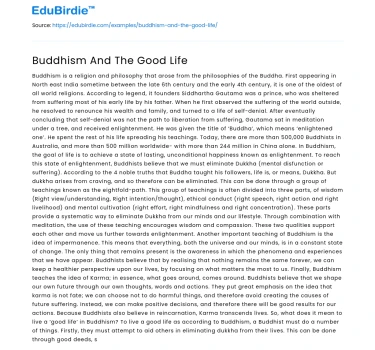Buddhism is a religion and philosophy that arose from the philosophies of the Buddha. First appearing in North east India sometime between the late 6th century and the early 4th century, it is one of the oldest of all world religions. According to legend, it founders Siddhartha Gautama was a prince, who was sheltered from suffering most of his early life by his father. When he first observed the suffering of the world outside, he resolved to renounce his wealth and family, and turned to a life of self-denial.
After eventually concluding that self-denial was not the path to liberation from suffering, Gautama sat in meditation under a tree, and received enlightenment. He was given the title of ‘Buddha’, which means ‘enlightened one’. He spent the rest of his life spreading his teachings. Today, there are more than 500,000 Buddhists in Australia, and more than 500 million worldwide- with more than 244 million in China alone.
Save your time!
We can take care of your essay
- Proper editing and formatting
- Free revision, title page, and bibliography
- Flexible prices and money-back guarantee
In Buddhism, the goal of life is to achieve a state of lasting, unconditional happiness known as enlightenment. To reach this state of enlightenment, Buddhists believe that we must eliminate Dukkha (mental disfunction or suffering). According to the 4 noble truths that Buddha taught his followers, life is, or means, Dukkha. But dukkha arises from craving, and so therefore can be eliminated. This can be done through a group of teachings known as the eightfold-path.
This group of teachings is often divided into three parts, of wisdom (Right view/understanding, Right intention/thought), ethical conduct (right speech, right action and right livelihood) and mental cultivation (right effort, right mindfulness and right concentration). These parts provide a systematic way to eliminate Dukkha from our minds and our lifestyle. Through combination with meditation, the use of these teaching encourages wisdom and compassion. These two qualities support each other and move us further towards enlightenment.
Another important teaching of Buddhism is the idea of impermanence. This means that everything, both the universe and our minds, is in a constant state of change. The only thing that remains present is the awareness in which the phenomena and experiences that we have appear. Buddhists believe that by realising that nothing remains the same forever, we can keep a healthier perspective upon our lives, by focusing on what matters the most to us.
Finally, Buddhism teaches the idea of Karma; in essence, what goes around, comes around. Buddhists believe that we shape our own future through our own thoughts, words and actions. They put great emphasis on the idea that karma is not fate; we can choose not to do harmful things, and therefore avoid creating the causes of future suffering. Instead, we can make positive decisions, and therefore there will be good results for our actions. Because Buddhists also believe in reincarnation, Karma transcends lives.
So, what does it mean to live a ‘good life’ in Buddhism?
To live a good life as according to Buddhism, a Buddhist must do a number of things. Firstly, they must attempt to aid others in eliminating dukkha from their lives. This can be done through good deeds, such as giving to those in need of help, and through abstaining from bad deeds, such as stealing, lying, cheating and adultery. In Buddhism, compassion is a key virtue; therefore, a Buddhist should be compassionate.
Secondly, according to a part of Buddhist teaching called ‘Sila’, a Buddhist should not destroy or harm life. This is because Buddhists believe that nothing is ever gone in the universe; it simply changes form- which means that everything consists of the same material; and to destroy something around us is to destroy ourselves. Because of this teaching, to live a good life, a Buddhist should adopt a vegetarian diet.
A Buddhist should also be measured in materialistic pleasures. Buddha teaches that humans should be able to enjoy material comforts without going to extremes- that we should enjoy them in a conscientious way. By doing so, we can ensure that they do not hinder our spiritual progress. We cannot truly live a good life if we only culture its material aspect; and therefore, to live a good life, a Buddhist should ensure they also have a spiritual and moral foundation.
Finally, a Buddhist should refrain from creating suffering from bad actions. They should try to cultivate the good and reduce suffering by performing good deeds and acts of service. By doing so, because of the idea of Karma, he will receive good deeds in turn; not only in this life, but in the next; so much so that the life that a Buddhist is born into when they are reincarnated is decided by the quality of their deeds
Conclusion
In conclusion, to live a good life, a Buddhist should be compassionate; they should not destroy or harm life; they should be measured in their materialistic pleasures, and finally, should do good deeds, to cultivate good karma. A Buddhist who follows these teachings can be considered to have lived a ‘good life’.






 Stuck on your essay?
Stuck on your essay?

